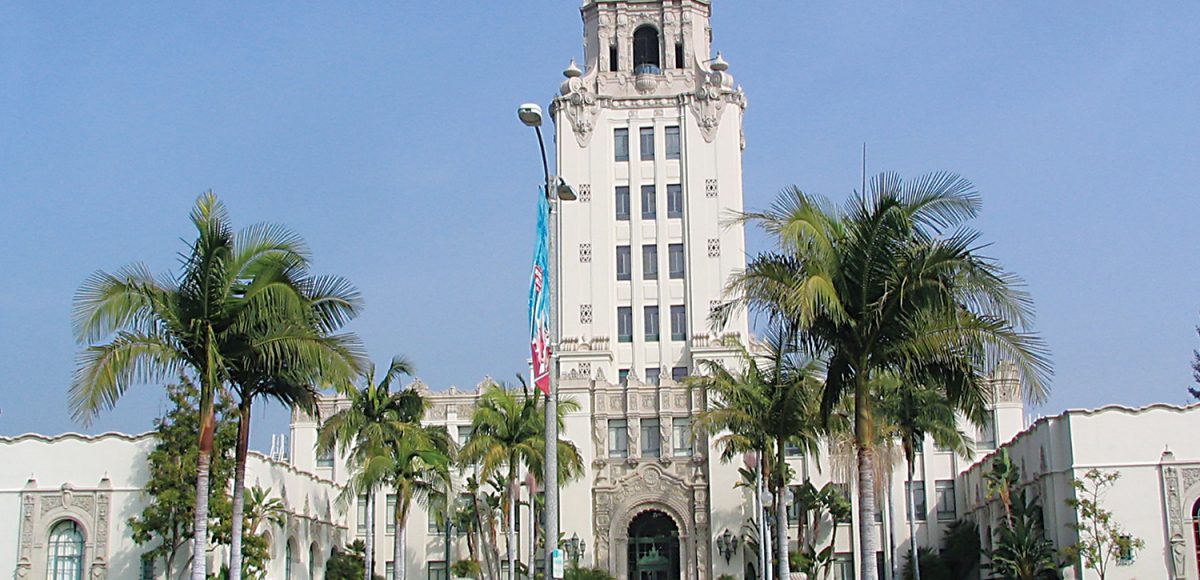In its Feb. 20 Study Session meeting, the Beverly Hills City Council discussed residents’ concerns about an eight-story mixed-use development at 9229 Wilshire Blvd., but ultimately determined that the project must proceed per state law.
The 56-unit project was unanimously approved by the Planning Commission on Feb. 8. It is located on the corner of Wilshire Boulevard and Maple Drive and contains ground-floor retail space, six stories of housing and a rooftop residential amenity space.
The project is allowed to significantly exceed the city’s zoning limits under the state’s density bonus law, because it reserves six units for very-low income households.
Specifically, the development increases maximum building height from 45 feet to 83 feet, increases maximum number of stories from three to eight and decreases the setback (distance from structure to property line) requirement from 6 feet to zero.
Residents with single-family homes on the nearby residential street of Maple Drive had a litany of concerns over the project. Those concerns included fears about increased traffic, increased crime, insufficient parking spaces, traffic danger from the reduced setback, loss of privacy from the buildings’ balconies and a belief that the density bonuses were calculated incorrectly.
Councilmember John Mirisch had asked that the matter be placed on the Study Session agenda to determine if a formal review was warranted. He was unable to attend the session due to illness, however.
Nevertheless, the remaining four City Council members listened intently as approximately two dozen residents shared their vehement objections to the project.
“It will destroy our privacy, clog our streets and fill our sidewalks with strangers causing increased crime,” said Maple Drive resident Larry Mattson. “What these developers are doing is trampling our right to the pursuit of happiness.”
Councilmembers were sympathetic to residents’ concerns, but also aware of the fact that they cannot override the state’s density bonus law. City planning staff also addressed residents’ concerns about the density bonuses and confirmed that they were correctly calculated using the most up-to-date formulas provided by the state.
“Sacramento is forcing us to do stuff that we really don’t want to do, and I think in our hearts nobody up here is happy for having to do this. It’s not what we want for our city,” said Mayor Dr. Julian Gold. “But we’re in this unfortunate place of really having nowhere to go.”
Several of the residents asked the city to challenge the state density bonus law in court. However, Councilmembers were unwilling to do so citing a low likelihood of success and the fact that the city is already in trouble with Sacramento for failing to meet the state’s ambitious housing goals.
The city is already facing a lawsuit over its housing policy and is currently appealing a Los Angeles Superior Court Ruling which, if upheld, would prevent the city from issuing all building permits—except those that add to the city’s overall housing stock—until the state approves its Housing Element.
“I think everybody in this room understands the importance of getting an approved Housing Element and just how essential that is for us,” said Councilmember Lili Bosse. “We don’t want our city to lose more control to the state.”
Councilmember Sharona Nazarian said that while she would love to challenge the density bonus law in court, the city of San Diego has already filed such a suit and been defeated.
“I wish there was more that we could do as far as having a say over state law, but even this has gone to the Court of Appeals,” she said, referencing the San Diego case. “So, if we were to even go against this decision, it has already gone to court.”
Nazarian assured residents that the city will pay close attention to the impact of construction noise and traffic created by the project and take appropriate action if problems emerge.
“I wish that there was more that we could do as a council,” she said. “I know that the city is going to do what they can to help mitigate the impact that this project is going to have on the residents and our community as far as construction noise and parking restrictions.”







